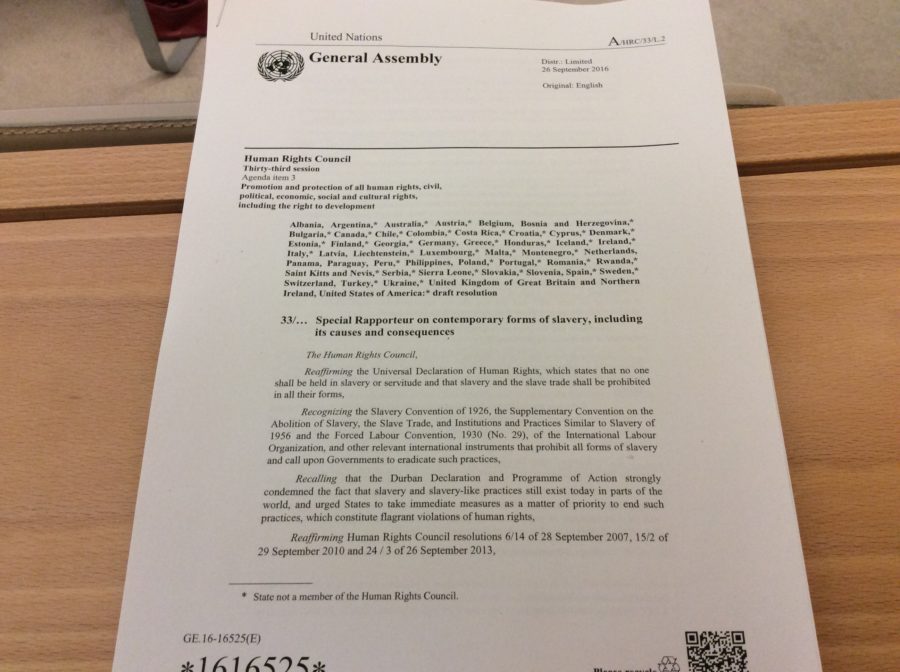26th September 2016 Geneva, Switzerland
The Ghosts of Councils Past


I’ve been having a spooky session. For the past fortnight people who left the Council many moons ago have been popping up all over the place as though they never left. Former colleagues do of course come back from time to time but it’s been happening so much recently I’m starting to wonder if I’m having a paranormal experience. Like the boy in Sixth Sense, I feel like I’m the only one who can see former colleagues who don’t know they’re not supposed to be here walking around like normal delegates. Or maybe I just need a bit more sleep.
Week 2 of the session was a typically hard slog and the strain got quite unpleasant as we approached Thursday’s deadline for tabling resolutions. For those not used to working inside the Council’s pressure cooker, it feels like having a particularly sadistic personal trainer screaming in your ear to keep working harder, however little food or rest you’ve had, until the resolutions are all tabled. Then you can pause for breath and water. But probably not food. And only briefly.
I’m among those leading on one of the 30 or so resolutions that have been presented this session. The UK is seeking to renew the UN’s Special Rapporteur on Contemporary Slavery for another 3 years and to bring her mandate up to date with the 2030 Agenda for Sustainable Development which has a specific target on ending slavery. The best measure of support for resolutions is how many other countries have joined as ‘co-sponsors’ and as the tabling deadline draws near the quest to get signatures of co-sponsors does funny things to people. Delegates take on the persona of a dodgy second hand car dealer, giving their precious texts the hard sell to anyone they can find. If two people looking for co-sponsors happen to bump into each other, an adolescent ritual unfolds of I’ll show you mine if you show me yours, before a deal is done and the hunt for signatures goes on.

The Council will have important decisions to make in the week ahead on some countries which have been on its agenda for many years. There is often talk here about how the Council could and should play a more preventive role by reacting quickly when a country’s human rights situation deteriorates. But the Council has too often reacted too late, frustrated by those states who oppose scrutiny of individual countries. And even when it has responded it has struggled to stay the course and keep countries under consideration for long enough. When the Council decided to end its Independent Experts on the DRC in 2008 and on Burundi in 2011 it clearly did so much too prematurely.
There is growing concern once more about the potential for large-scale violations following delays to elections in the DRC, with reports of detentions, disappearances and attacks on government opponents. The DRC has engaged to an extent on a suitable response by the Council. But with 50 people reportedly killed in clashes over the last week, the real test will be whether the Council is able to react quickly to the situation on the ground to prevent more killings and other violations.
Regrettably Burundi has so far refused to accept that there should be any response by the Council to the shocking report released last week which found that gross human rights violations continue to occur, with the involvement of high ranking Government agents. The report documents targeted killings, large scale detentions and torture, and warns that without external attention the situation is likely to spiral further downward. This is a clear case where the council must respond in the strongest terms.
There will also be plenty of attention on what happens on both Sudan and Yemen. In the case of Sudan, it will be important to maintain scrutiny and unity in response to reports of ongoing attacks on civilians in Darfur, Blue Nile State, and South Kordofan.
On Yemen both the Arab group and the EU have presented their own resolutions following the recent report by High Commissioner Zeid which called for an independent international investigation in the country. The Arab Group’s draft did not go far enough for many towards meeting this call which led EU states to hastily present a rival text last week. The best scenario all round would be to reach consensus on a form of independent investigation and reporting to Council that can help bring down the level of violations and abuses in the country but so far agreement has proved elusive.
It looks set to be a difficult week and I’ll be back to let you know what happens after it’s done and dusted. Let’s hope the Council puts some past ghosts to rest.
Another great read Bob. Intrigued to know who has reappeared at the Council. Keep up the great work!